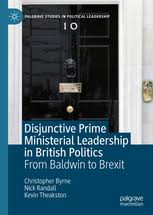
Dear All,
I want to apologise for the interruption in updates. We will now resume our bi-monthly service.
Please do send along any new articles, events or notices b.worthy@bbk.ac.uk
Jean Blondel
We were sad this January to hear of the passing of Jean Blondel, some of us who knew him personally. His work, which stretched from the age of De Gaulle to Trump, completely reshaped our understanding of political leadership. In his extraordinarily long career, his restless intelligence and willingness to continually push boundaries should be a model for us all. On a personal level, I remember his kindness, help and unflagging enthusiasm when he was working on a collection of ours. Most of all, I think of his ability to give over to us the thing we all have least of-time.
There’s a nice obituary here by Ivor Crewe, who worked with him https://www.theguardian.com/books/2023/jan/18/jean-blondel-obituary and another by Ian Budge reflecting on his institutional and intellectual legacies https://theloop.ecpr.eu/jean-blondel-1929-2022-a-great-man/
Articles
Here’s a double of two great pieces from our own members:
James, T. S. (2022). Assessing the policy effects of political leaders: a layered framework. The Trump Administration, 3-20. https://www.tandfonline.com/doi/pdf/10.1080/01442872.2021.1949090?needAccess=true&role=button
Helms, L. (2023). Prime ministers in waiting? Women leaders of the opposition in Westminster systems. Party Politics, 13540688231166873. https://journals-sagepub-com.ezproxy.lib.bbk.ac.uk/doi/pdf/10.1177/13540688231166873
Other Interesting pieces
Can we trust leaders? Good question: Holdo, M. (2022). How can we trust a political leader? Ethics, institutions, and relational theory. International Political Science Review, 43(2), 226-239. https://journals-sagepub-com.ezproxy.lib.bbk.ac.uk/doi/pdf/10.1177/0192512120913572
How is ambition gendered? See some rather disappointing and worrying research here: Bos, A. L., Greenlee, J. S., Holman, M. R., Oxley, Z. M., & Lay, J. C. (2022). This one’s for the boys: How gendered political socialization limits girls’ political ambition and interest. American Political Science Review, 116(2), 484-501. https://www-cambridge-org.ezproxy.lib.bbk.ac.uk/core/services/aop-cambridge-core/content/view/FC49F85EDDAAA804DCBFBA63C6C437F0/S0003055421001027a.pdf/div-class-title-this-one-s-for-the-boys-how-gendered-political-socialization-limits-girls-political-ambition-and-interest-div.pdf
Finally, some developing ideas on ‘political control’: Hassan, M., Mattingly, D., & Nugent, E. R. (2022). Political control. Annual Review of Political Science, 25, 155-174. https://www.annualreviews.org/doi/full/10.1146/annurev-polisci-051120-013321
Events
Workshop on Contemporary Political Leadership: Jun 9 2023 Guilford/Online 10-12.30 [GMT]
Book here: https://www.eventbrite.co.uk/e/workshop-on-contemporary-political-leadership-tickets-636479987777
An expert-led workshop of cutting-edge research on contemporary political leadership
Political leaders are prominent dimensions of contemporary life; managing pandemics, shaping voting behaviour, steering policy agendas and beyond.
The Centre for Britain and Europe at the University of Surrey is delighted to present a hybrid in-person/online workshop showcasing cutting-edge research into political leadership and engaging with contemporary discussions of what we can expect from our leaders. With Dr Alia Middleton (University of Surrey), Dr Ben Worthy (Birkbeck, University of London) and Dr Louise Thompson (University of Manchester)
Programme:
Panel: 10:00-11:30
- “High Politics and High Vis Jackets: visual constructions of leadership by British Prime Ministers”, Dr Alia Middleton and Dr Nick Randall University of Surrey, Newcastle University
- “Goodbye Britain’s Berlusconi” Dr Ben Worthy Birkbeck, University of London
- “The Awkward Squad- parliamentary after-lives of former PMs. “ Dr Louise Thompson, University of Manchester
11:30-12:30: Challenges to Political Leadership roundtable
- Dr Alia Middleton
- Dr Ben Worthy
- Dr Louise Thompson








